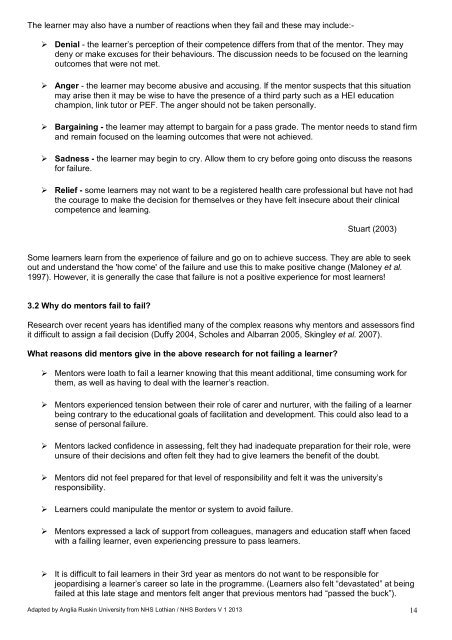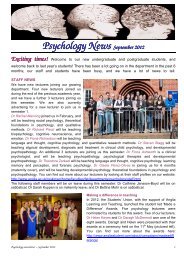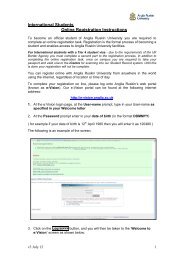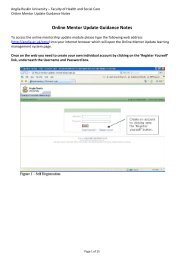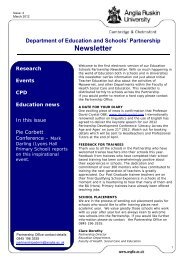Supporting the underachieving learner - Guide for mentors
Supporting the underachieving learner - Guide for mentors
Supporting the underachieving learner - Guide for mentors
Create successful ePaper yourself
Turn your PDF publications into a flip-book with our unique Google optimized e-Paper software.
The <strong>learner</strong> may also have a number of reactions when <strong>the</strong>y fail and <strong>the</strong>se may include:-<br />
Denial - <strong>the</strong> <strong>learner</strong>’s perception of <strong>the</strong>ir competence differs from that of <strong>the</strong> mentor. They may<br />
deny or make excuses <strong>for</strong> <strong>the</strong>ir behaviours. The discussion needs to be focused on <strong>the</strong> learning<br />
outcomes that were not met.<br />
Anger - <strong>the</strong> <strong>learner</strong> may become abusive and accusing. If <strong>the</strong> mentor suspects that this situation<br />
may arise <strong>the</strong>n it may be wise to have <strong>the</strong> presence of a third party such as a HEI education<br />
champion, link tutor or PEF. The anger should not be taken personally.<br />
Bargaining - <strong>the</strong> <strong>learner</strong> may attempt to bargain <strong>for</strong> a pass grade. The mentor needs to stand firm<br />
and remain focused on <strong>the</strong> learning outcomes that were not achieved.<br />
Sadness - <strong>the</strong> <strong>learner</strong> may begin to cry. Allow <strong>the</strong>m to cry be<strong>for</strong>e going onto discuss <strong>the</strong> reasons<br />
<strong>for</strong> failure.<br />
Relief - some <strong>learner</strong>s may not want to be a registered health care professional but have not had<br />
<strong>the</strong> courage to make <strong>the</strong> decision <strong>for</strong> <strong>the</strong>mselves or <strong>the</strong>y have felt insecure about <strong>the</strong>ir clinical<br />
competence and learning.<br />
Stuart (2003)<br />
Some <strong>learner</strong>s learn from <strong>the</strong> experience of failure and go on to achieve success. They are able to seek<br />
out and understand <strong>the</strong> 'how come' of <strong>the</strong> failure and use this to make positive change (Maloney et al.<br />
1997). However, it is generally <strong>the</strong> case that failure is not a positive experience <strong>for</strong> most <strong>learner</strong>s!<br />
3.2 Why do <strong>mentors</strong> fail to fail?<br />
Research over recent years has identified many of <strong>the</strong> complex reasons why <strong>mentors</strong> and assessors find<br />
it difficult to assign a fail decision (Duffy 2004, Scholes and Albarran 2005, Skingley et al. 2007).<br />
What reasons did <strong>mentors</strong> give in <strong>the</strong> above research <strong>for</strong> not failing a <strong>learner</strong>?<br />
Mentors were loath to fail a <strong>learner</strong> knowing that this meant additional, time consuming work <strong>for</strong><br />
<strong>the</strong>m, as well as having to deal with <strong>the</strong> <strong>learner</strong>’s reaction.<br />
Mentors experienced tension between <strong>the</strong>ir role of carer and nurturer, with <strong>the</strong> failing of a <strong>learner</strong><br />
being contrary to <strong>the</strong> educational goals of facilitation and development. This could also lead to a<br />
sense of personal failure.<br />
Mentors lacked confidence in assessing, felt <strong>the</strong>y had inadequate preparation <strong>for</strong> <strong>the</strong>ir role, were<br />
unsure of <strong>the</strong>ir decisions and often felt <strong>the</strong>y had to give <strong>learner</strong>s <strong>the</strong> benefit of <strong>the</strong> doubt.<br />
Mentors did not feel prepared <strong>for</strong> that level of responsibility and felt it was <strong>the</strong> university’s<br />
responsibility.<br />
Learners could manipulate <strong>the</strong> mentor or system to avoid failure.<br />
Mentors expressed a lack of support from colleagues, managers and education staff when faced<br />
with a failing <strong>learner</strong>, even experiencing pressure to pass <strong>learner</strong>s.<br />
It is difficult to fail <strong>learner</strong>s in <strong>the</strong>ir 3rd year as <strong>mentors</strong> do not want to be responsible <strong>for</strong><br />
jeopardising a <strong>learner</strong>’s career so late in <strong>the</strong> programme. (Learners also felt “devastated” at being<br />
failed at this late stage and <strong>mentors</strong> felt anger that previous <strong>mentors</strong> had “passed <strong>the</strong> buck”).<br />
Adapted by Anglia Ruskin University from NHS Lothian / NHS Borders V 1 2013 14


